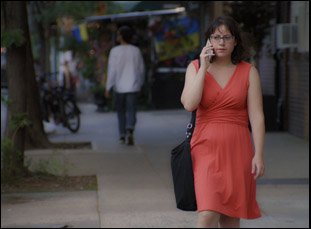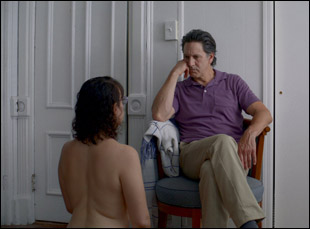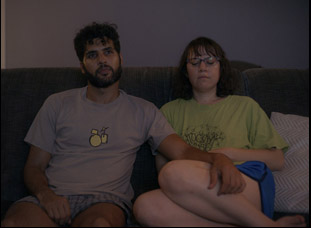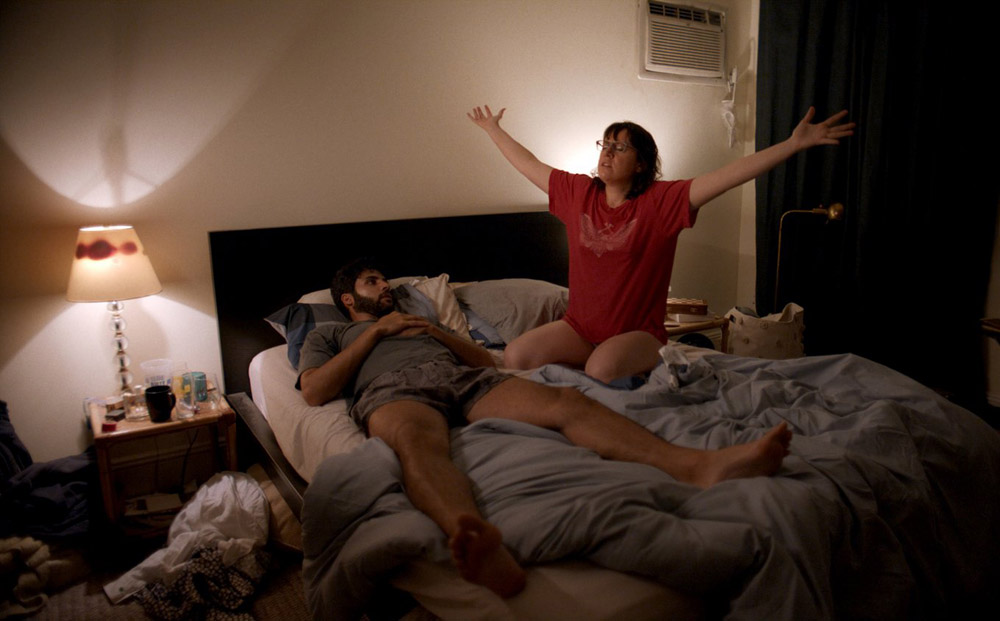Budgetary concerns had Joanna Arnow scrambling to rethink a scene in which her character in “The Feeling That the Time for Doing Something Has Passed” would belt out a show tune, though rights issues made a real Broadway number likely unobtainable for the scrappy New York indie production. A friend had reminded her of a song she once composed herself in high school about Harry Potter and soon she was singing a few bars in front of the camera. Arnow didn’t need much coaxing, but the song’s provenance had the writer/director inching closer to something that was personal, still filled with the grandeur that has had some mistaking it for a ballad right out of “Les Miserables,” but peculiar enough and performed with an inherent vulnerability to hit notes of reality that whatever Arnow originally had in mind would not.
That Arnow could even surprise herself in making her narrative debut feature when she’s never been shy about investing herself fully in her work is indicative of what’s in store for audiences with the deliriously entertaining comedy in which she stars as Ann, who finds it hard to attain satisfaction in any area of her life from her dull 9 to 5 job to spicier nights in a BDSM relationship with an older man (Scott Cohen) that is starting to have diminishing returns. The filmmaker, who has long made sex a healthy part of her work as fuller portraits of the women she portrays in her short “Bad at Dancing” and her hybrid docufiction “I hate myself:),” shrewdly seizes upon the practice of taking directions in the bedroom as a way of looking at the ambivalence she has towards moving forward in the world, considering the possibilities of a more conventional romance with someone her own age in Chris (Babak Tafti) and rowing where the tide is going culturally rather than against it as has always been her instinct.
Although Arnow has put herself at the center of her films, dubbing them “autofiction” where their birth from a personal place doesn’t necessarily mean reenactments from her own experience, she’s gifted at seeing the unforgiving world around her, mining humor from its relentless pace and the absurdities that pile up from attempting to keep up. While her on-screen presence raises questions about what’s real and what’s not (particularly when her own parents play the same role on screen and the film is filled with denizens of the New York film scene), she deftly gets at usually abstract truths in “The Feeling That the Time for Doing Something Has Passed” about desire, aging and to find meaning, distinguishing herself in ways beyond her deadpan comic persona as a filmmaker. On the eve of the film’s release after a festival run that began just shy of a year ago at Cannes, Arnow was joined by co-stars Cohen and Tafti to talk about how they could arrive at such a unique tone, the challenges and the benefits of having the director be your scene partner and ultimately getting to a good place with the material.

Joanna Arnow: I had been working on a feature script previously, but it had been taking a while and I missed writing. Writing is one of my favorite parts of the process and I’ve been interested in concise humor for a long time, so I decided to kind of run with that and write a lot of short scenes that drew on personal experience. I wrote as many as I could and had about 250 pages of raw material to structure into this film. I was just interested in exploring the way this character wrestles with relationships and sexuality and finding the humor of everyday experience.
Scott, what got you interested in this?
Scott Cohen: One of the producers of the film, Pierce Varous, was somebody that I worked with before and suggested me. I read the script and fell in love with it and I saw Joanna’s short that she had brought to Berlin and and thought, “I want to be a part of whatever she’s doing.” And this movie took forever to make because it was first [set up] during COVID, so they kept on saying, “We’re delayed, we’re delayed, we’re delayed,” and I kept on saying, “I’m gonna make time, I’m gonna make time,” and thank God I was free when we did it because I really wanted to do it.
Babak, is it true you were actually up for a different role entirely?
Babak Tafti: I had just finished a role where I was playing a character that was not the best dude in the world, so when I read the scripts, the original role I was talking to Joanna about, I was like, “Yeah, yeah, maybe…” but then I saw this Chris character and it was a character that I hadn’t been able to do before. I’d never gotten the ability to play someone who was so wonderfully vulnerable and full-hearted with a comedy edge, so my team went to Joanna to see if she would be interested in talking to me about it. We had a meeting, and she said yes.
Joanna Arnow: It’s funny, because after Babak and I Zoomed about a different role, even before you e-mailed and said you would be interested, I [thought], “Oh my God, maybe I was asking him about the wrong part, and I should ask him about the Chris role as well?” Because I feel like there’s just so much life and thought in your work, Babak, and the scenes with Chris are so dialogue-driven that I really was excited to see you in that role, working with that comedy. I think the characters that both [Babak and Scott] play are quite different than the roles that they’ve done before, which is exciting to me to work with people who are working in different directions than typical.

Joanna Arnow: I feel like it always changes in rehearsal and seeing what the actors are bringing to it. We had a lot of discussion about character and the relationships involved, and it all informed what ended up in the movie. The rehearsals were quite important and we made sure to have two-day weekends, so that I could actually have one rehearsal day on my weekend to have that extra time.
Scott Cohen: Yeah, when I look back on the rehearsals, I think that I started with what I thought was a very open mind, but was actually not so open and it took me a while to understand where Joanna was trying to head. I had this whole obsession with Alan and needed to find where’s his charm, and we talked about it, but that really wasn’t necessarily the direction she had for the character. Once we got on set, I felt like, “Oh, this is what she’s moving toward” — the timing, the feel, the awkwardness, the uncomfortableness, but also the comfortableness within the relationship of the two of them, and I started to understand that. And so it was about fitting into this rhythm and vibe, whatever you want to call it, and finding all the cliches of acting — intention and place and honesty and authenticity — that come up because of that.
Babak Tafti: Joanna was so great at inner specificity. When we would do these rehearsals, I locked into the breath in her work, the breath in the scenes and sometimes we would even play with counting down before a certain line is said. A lot of these scenes also take place in the middle of where you would expect a scene to start, so we would do a little improv beforehand and then go into the scene to give it that continuation feel. It was really helpful as far as finding the rhythm and the flow, because as an actor, I tend to have a motor going, so it was nice to learn what her rhythms are and I can actually really let things air out and let everything find its way as opposed to forcing anything. Everything felt very natural and it was something that I think the rehearsals were really helpful with as far as understanding how she wanted to go.

Joanna Arnow: It was a fairly small team, so we got to know each other pretty well and in terms of creating a safe environment, especially with the intimacy scenes, that was a priority to make a safe and comfortable environment for all the actors, including myself. We had a lot of conversations about blocking and comfort levels and used all standard intimacy scene protocols, like a closed set. I just tried to be as prepared as possible and hear everyone as well as I could. I also had a really silly clipboard that I carried around my preparation for the day’s scenes that really helped me keep track of everything, even though running around set sometimes being like, “Where’s my clipboard?” everyone [else] would be like, “Joanna’s clipboard! We need eyes on that.” But we’d get there and make sure safety first.
Scott Cohen: The difficult thing about working with a director who’s acting in it is [when] you do these elongated scenes, which were very, very, very long, she has to go back and watch that scene, so as an actor, you do the scene and then you’re waiting for the playback, which is very long, and then you do the scene again, so you’re there twice as long and it’s pretty funny, actually.
Joanna Arnow: Sorry for the delays. [laughs]
Scott Cohen: But the reality is you’re working with an auteur, and you wait because you trust that the auteur knows what they’re doing and you’re part of the vision. You’re not there forever. You’re there for a certain amount of time and my job is to give what this person in service to whatever it may be. And when you’re working with somebody like that, you just give yourself over to it. That’s a wonderful place to be. You feel taken care of and you feel free and you feel improvisatory and you feel creative. It’s a joy to work on a set like that [rather] than with somebody that doesn’t really know what they’re doing or makes a million different decisions because they’re trying to appease everybody. There’s a very clear concept involved [here] and you’re working within that context. It was really quite freeing to me.
“The Feeling that The Time for Doing Something Has Passed” opens on April 26th in New York at the IFC Center, the Brooklyn Academy of Music and FilmLinc’s the Elinor Bunin Munroe Film Center and in Los Angeles at the Laemmle Glendale on February 10th.




